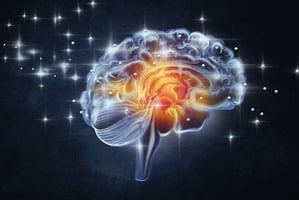Previous studies have found that repetitive transcranial magnetic stimulation (rTMS)—a noninvasive...
TMS May Help Reduce Symptoms of Depression, PTSD in Veterans

Transcranial magnetic stimulation (TMS), a noninvasive procedure that uses magnetic fields to stimulate nerve cells in the brain, may help relieve symptoms of depression and posttraumatic stress disorder (PTSD) in veterans, a study in the Journal of Affective Disorders has found.
Michelle R. Madore, Ph.D., of VA Palo Alto Healthcare System and colleagues analyzed data from 770 patients who had major depressive disorder and received at least one TMS session at any of 27 Veterans Administration sites from October 2017 to March 2020. Of these patients, 68.4% also met the criteria for a diagnosis of PTSD. The researchers defined an adequate dose of TMS as 30 sessions over the course of six to eight weeks. Among all patients, 340 received an adequate dose of TMS.
The researchers used the nine-item Patient Health Questionnaire (PHQ-9) and the PTSD symptom checklist from DSM-5 (PCL-5) to assess the patients’ mental health before and after the study period.
Among the 340 patients who received all 30 TMS sessions, scores on the PHQ-9 dropped from a mean of 18.34 before treatment to a mean of 11.29 after treatment, suggesting an improvement in their major depressive disorder. In this group, 245 had also met the criteria for PTSD at baseline with a mean PCL-5 score of 52.67, indicating moderate PTSD severity. After TMS, the mean PCL-5 score in this subset was 33.74. Furthermore, 113 (46.1%) of these patients no longer met PTSD criteria.
“These data demonstrate the importance of delivering an entire TMS treatment series,” Madore and colleagues wrote. “Future studies will need to evaluate the relationship between the number of sessions required for optimal outcomes; however, since remission is the goal of antidepressant treatment, patients can be empirically recommended to receive six weeks of TMS.”
For related information, see the American Journal of Psychiatry article “Whither TMS: A One-Trick Pony or the Beginning of a Neuroscientific Revolution?”
(Image: iStock/Im Yeongsik)
Don't miss out! To learn about newly posted articles in Psychiatric News, please sign up here.






